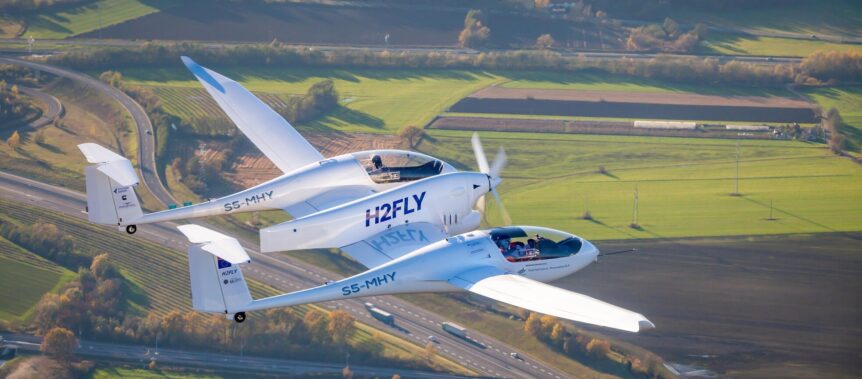H2Fly has an historic aircraft in its fleet, the HY4, as part of the HEAVEN program to, “Demonstrate the use of liquid, cryogenic hydrogen in aircraft.” Originally the G4, the craft won the NASA Green Flight Challenge in 2011, posting a passenger mile per gallon efficiency of 403.5 – equivalent to driving your loaded Prius from San Francisco to Los Angeles on under four gallons of fuel. Resurrected as the HY4 and flown on gaseous hydrogen, the craft has been reconfigured to fly on liquid hydrogen, expanding its range significantly. According to the HEAVEN program, “The hydrogen-electric ‘HY4’ demonstrator aircraft took off from Maribor, Slovenia, and saw safe and efficient operation throughout multiple flight tests.” Announced September 7, these were the first piloted flights of a liquid hydrogen fueled aircraft. Four flights, including one that lasted over three hours, “Lay the foundation for long-range, emissions-free flight, with liquid hydrogen doubling the range of the HY4 aircraft to 1,500[kilometers], compared to …
Contrails and Climate Change
Contrails are the trails of condensed water vapor that follow an airplane at a high enough and cold enough altitude. They became a visible presence in World War II and were part of newsreels of allied bombers hitting Germany and dog fights over the English countryside. There was more than just an aesthetic side to the new, high clouds in the sky, though. Post-9/11 During the attacks on September 11, 2001, FAA controllers, “Did the only thing they could think of to try to control the situation: ordering every aircraft in U.S. airspace, about 4,000 of them, to land somewhere, anywhere, immediately.” “Canadian officials followed. Airports in Atlantic Canada quickly filled with thousands of bewildered people who had been flying west across the Atlantic from Europe, but found themselves stranded in Goose Bay, Labrador or Stephenville, [Newfoundland].” Following this mass grounding, an observable cooling took place. Andrew Carleton, a geographer at Pennsylvania State University recalled his observations at the time. “I remember walking …
EAS VIII: Klaus Ohlmann Conquers Everest
Klaus Ohlmann says the sailplanes and solar-powered aircraft in which he has set several world records are powered by a “gravitational engine with an external fusion reactor.” He has been on a sun-stoked roll the last few years. His recounting of the epic journey first to fly a Stemme motorglider from Germany to Katmandu, and then to conquer Mount Everest in a sailplane, kept the eighth annual Electric Aircraft Symposium audience enthralled. That feat alone would be enough for admiration, but his seemingly never-ending series of adventures provoke a bit of awe. He is a member of the Mountain Wave Project (MWP), a group which explores high-altitude weather systems to verify theoretical considerations. As stated in the MWP’s web site, it is “a project of the scientific and meteorological panel of OSTIV (Organisation Scientifique et Technique du Vol à Voile) …conceived during an OSTIV seminar 1998 in Serres/France by René Heise and Klaus Ohlmann and attracted several enthusiastic scientists/pilots since.” He holds the world’s …
EADS, Partners Open Electric Airplane Campus
The European Aeronautic Defense and Space Co. (EADS), IABG – a company providing analysis and testing for aerospace companies, and Siemens AG are collaborating along with educational partners the Technical University of Munich (TUM), the Bundeswehr University Munich, the Munich University of Applied Sciences, Bauhaus Luftfahrt, and the German Aerospace Center (DLR) to form the Ludwig Boelkow Campus consortium. Consortium partners have also signed a declaration of intent governing future cooperation between the newly founded Ludwig Boelkow Campus GmbH and the Munich Aerospace e.V., aerospace faculty. Named after an aerodynamicist who worked under Antony Fokker, and who headed development of the Messerschmidt ME-262 jet fighter in WWII, the campus will integrate multiple academic disciplines and industries in work designed to foster creative new ways of designing, building, and powering aircraft. With a primary goal to research areas of future flight, the campus and its industrial partners will help further development of next-generation European aircraft. As explained by EADS, projects reflect …


